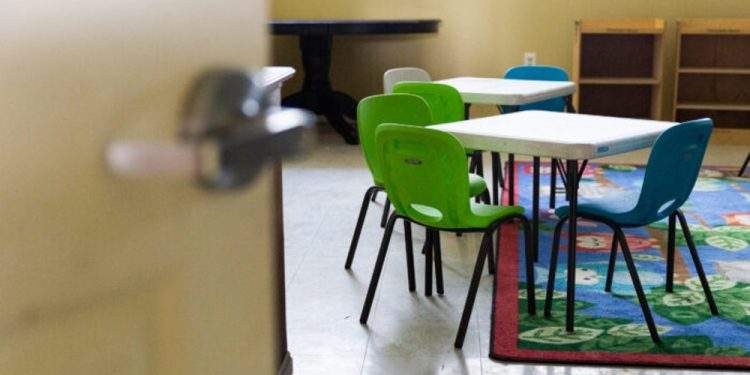- Watch The JD Rucker Show every day to be truly informed.
A parental rights group in Orange County, Calif., claims 23 students—eight of them elementary age—began social gender transitioning at a local school district without informed parental consent from January 2020 to October 2022.
The group, California Alliance for Education, obtained hundreds of pages of emails and documents from the Newport-Mesa Unified School District, which oversees pre-K through grade 12 schools for Newport Beach and Costa Mesa.
A parental rights advocate involved with the alliance who goes by the pseudonym Kim Davis for fear of retaliation told The Epoch Times that in all 23 cases, parents were either not informed about the initiation of their child’s Gender Support Plan, known as a GSP, or were told and did not consent.
“All of these gender support plans were offered to students without any knowledge of the parents. The student is then asked if they want their parents included in the meeting, or to know about it. So, it’s the student’s decision,” Davis said. “It’s possible some of the parents of the 23 children may have been informed later, but the emails show the process of social transition was initiated without their involvement.”

Social transitioning means changing a student’s name, pronouns, and their email address to reflect their new non-binary or transgender identity.
The emails, obtained by The Epoch Times, reveal the following incidents:
• District created plans to place mental health counselors in elementary schools to initiate GSPs with students without parental consent, and an elementary school principal and a director of student services discussed adding these counselors to assist with GSPs. In the email, the principal instructs a counselor to “build connection” with an elementary student and ask about preferred pronouns without first obtaining parental consent.
• A local LGBT activist pushed for the social transition of an elementary student against a parent’s wishes.
• Elementary school students were socially transitioned without parental consent. In one case, school counselors and teachers stated that a mom didn’t want her child to transition, and the school moved forward with the social transition of the child anyway.
• A district student services director celebrated more than 500 mental health check-ins by counselors underway at a school.
• The district made room assignments for sleepover camps, such as sixth-grade Science Camp, based on gender identity instead of biological sex.
• An elementary school principal instructed a counselor to connect with an elementary student and ask about preferred pronouns without first obtaining parental consent.
• That a high school student’s parents did not attend a gender support meeting because the student didn’t want the parents to know.
The public records also show that an activity called Gender and Sexuality Galaxies (pdf) produced by the progressive organization Action Canada for Sexual Health and Rights was sent to district counselors and psychologists, and one of the middle school mental health providers has pushed back against the teaching materials.
The colorful diagrams, which show 10 gender identities and 12 sexual orientation choices, with “infinite possibilities” of gender expression, were distributed to the counselors and psychologists on Trans Visibility Day on March 31, 2021, Davis said.
The document tells instructors to ask students to “imagine themselves as existing within the Gender Galaxy and the Sexuality Galaxy” and “imagine themselves as a space traveller” as they “write or draw their own story of planetary and space exploration.”

School District Policies
Annette Franco, a public relations officer for the school district, said in an email to The Epoch Times the district was not aware of the 23 cases documented by California Alliance for Education.
The district, she said, is required by antidiscrimination and privacy laws, including Assembly Bill (AB) 1266, to maintain confidentiality regarding a student’s gender support plan and preferred pronouns unless the student gives staff permission to inform their parents or guardians.
- Preserve your retirement with physical precious metals. Receive your free gold guide from Genesis Precious Metals to learn how.
“We have an obligation as public school employees to put our personal beliefs aside and abide by all applicable laws that govern public school districts,” Franco said.
She cited district policy, which requires it to notify parents and students annually about the possibility of transgender students participating in sex-segregated school programs and activities with students of the opposite gender.
“The notice shall inform students and parents/guardians that the district will not typically notify them of individual instances of transgender students participating in a program or activity,” the policy states.
The California Department of Education has provided guidance to teachers and counselors advising them not to inform parents or guardians when a student asks for a social transition unless the student wants to tell them.
But Davis contends these mandates aren’t the law.
AB 1266, a 2014 law known as the School Success and Opportunity Act, states that students must be permitted to participate in sex-segregated school programs and activities, and use facilities consistent with their gender identity without regard to their biological sex.
“That’s all the law says. It says nothing about socially transitioning kids without parental consent,” she said. “So, it’s not the law. The California Department of Education guidelines appear likely to be unlawful in that respect.”
Davis cited provisions under the California Education codes and the Protection of Pupils Rights Amendment (PPRA) Act, a federal law that states parents have a right to know and direct the upbringing of their children.
The guidelines suggest that unless a student wants to tell his or her parents, teachers must call a student by the child’s preferred pronouns at school but use the student’s natural or birth pronouns when they communicate with the child’s parents or face reprimand and possible criminal charges for harassment.
In a parent-teacher conference, for example, teachers are expected to refer to transgender students by their birth name, deceiving the parents of their child’s social transition in the classroom, Davis said.
Some teachers and administrative staff fear being fired for violating state mandates, because they are presented in a way that creates a fear of legal recourse if a teacher informs parents without the child’s consent or fails to use the student’s preferred pronouns, for example, Davis said.
“My heart absolutely breaks for all the amazing teachers who are put in such uncomfortable situations with these guidelines,” she said. “When you really break it down, what these guidelines are instructing teachers to do is lie to the parents. The deception to parents is such a huge issue, and it puts these teachers in such a moral conundrum.”
BETTER THAN DRUDGE: N.O.Q. Report is BACK as the conservative aggregator America needs.

Mental Health ‘Check-Ins’
Davis said mental health “check-ins” on students are another violation of parental rights.
“The district has just spent an enormous amount of resources on this army of mental health counselors who are coming into the classrooms and initiating ‘check-ins’ with students all without parental consent,” she said.
Parents are not aware of what the counselors are speaking to their children about, but these counselors are the ones initiating the Gender Support Plans, Davis said.
“This is actually pulling kids out of class to check in with them about their mental health, and so there is no survey that parents can opt out of, there is no transparency over when and how these check-ins are occurring,” she said. “It’s alarming.”
Haley Jenkins, a parent who pulled her children out of school in the district, told The Epoch Times parents have heard about gender support plans and the gender and sexualities charts but felt the district wasn’t being transparent about the issues, so they filed a public records act request.
“We’ve been hearing rumors from different teachers and students that social transitioning was taking place at the district,” Jenkins said. “As a parent, I believe all parents or guardians deserve to know when they send their child to school, that they’re going to come back home as the same child. And that is not the case.”
Jenkins said the emails exchanged between school staff are “really concerning.”
“There’s a lot of parents that don’t even know what a gender support plan is or how that works,” she said. “Basically, your rights as a parent are taken away. … Every parent deserves to know if something serious like that is happening at school.”
Many parents don’t know, for example, that when they send their elementary-age children to an overnight science camp, students of the opposite sex could be rooming and showering together, she said.
“As a parent, you deserve to know what is happening … and if your child is not safe,” she said. “I don’t know that I feel comfortable sending my child to school when there’s a child of the opposite sex in the same locker room as them or same bathroom as them.”
The emails reveal that there is some pushback from teachers over the policies, but the mental health counselors are affirming new gender identities of students without telling parents.
“They’re keeping a secret from you, and they’re working with the child instead of working with you to help the child,” she said. “Parents are in charge of their children, full stop—not the school, not the child. The parents are in charge.”
Jenkins pointed out that Newport Harbor High School has links on its website to resources for lawyers, doctors, and surgeons that are actively pushing gender-affirming care.
Up until a few months ago, the high school had links to a meet-and-greet event with the surgeons at the University of California–Irvine, and places to get chest binders which, she said, are known to cause physical damage to children.
“It’s just really scary,” she said.
Parental Rights Legislation
Meanwhile, Republicans introduced state and federal legislation this week to defund states that allow the secret transitioning of minors at schools.
- Concerned about your life’s savings as the multiple challenges decimate retirement accounts? You’re not alone. Find out how Genesis Precious Metals can help you secure your wealth with a proper self-directed IRA backed by physical precious metals.
On March 15, U.S. Rep. Doug LaMalfa (R-Richvale) introduced HR 1585, a House of Representatives bill that would block funds for states that allow such transitioning. The bill would require states under Title II of the Elementary and Secondary Education Act of 1965 to implement a policy prohibiting the controversial practice.
Two days earlier, California Assemblymen Bill Essayli (R-Riverside) and James Gallagher (R-Yuba City) introduced parental rights legislation, Assembly Bill 1314, which would require teachers, counselors, and other school staff to notify parents in writing within three days if they find a student is identifying as a gender other than what is stated on their birth certificate.
The proposed legislation would mean an end to the current controversial policy of keeping the gender transition of some students secret in California, depending on whether the child wants to tell his or her parents.
Article cross-posted from our premium news partners at The Epoch Times.

It’s becoming increasingly clear that fiat currencies across the globe, including the U.S. Dollar, are under attack. Paper money is losing its value, translating into insane inflation and less value in our life’s savings.
Genesis Gold Group believes physical precious metals are an amazing option for those seeking to move their wealth or retirement to higher ground. Whether Central Bank Digital Currencies replace current fiat currencies or not, precious metals are poised to retain or even increase in value. This is why central banks and mega-asset managers like BlackRock are moving much of their holdings to precious metals.
As a Christian company, Genesis Gold Group has maintained a perfect 5 out of 5 rating with the Better Business Bureau. Their faith-driven values allow them to help Americans protect their life’s savings without the gimmicks used by most precious metals companies. Reach out to them today to see how they can streamline the rollover or transfer of your current and previous retirement accounts.








